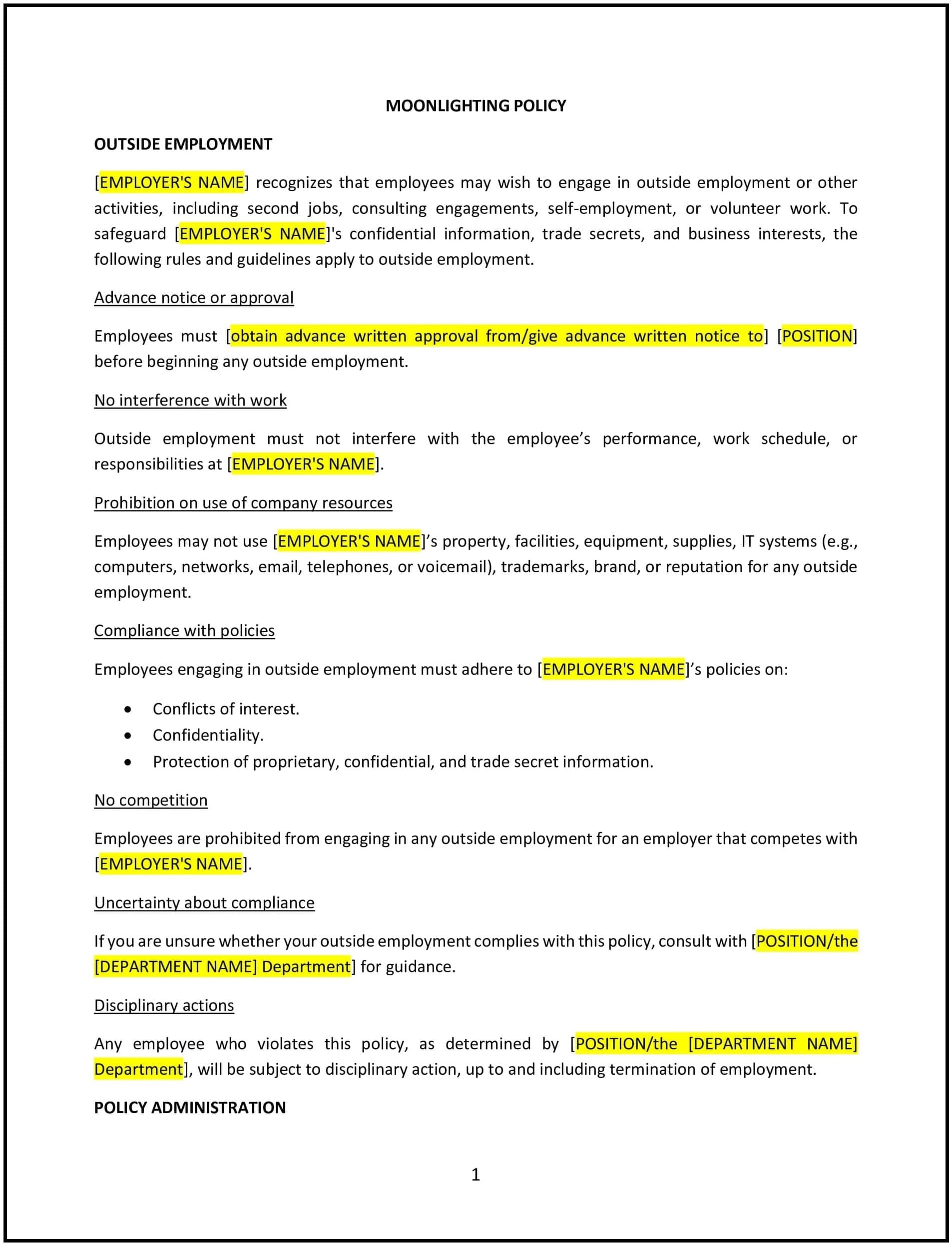Got contracts to review? While you're here for policies, let Cobrief make contract review effortless—start your free review now.

Customize this template for free
This moonlighting policy is designed to help Washington businesses manage employees who wish to engage in additional employment outside of their primary work duties. The policy outlines the company’s expectations regarding outside work, ensures there is no conflict of interest, and provides guidelines on how moonlighting can affect job performance. It aims to prevent any negative impact on the employee’s responsibilities and the company’s operations while offering flexibility for employees seeking additional income or professional development.
By adopting this policy, businesses can maintain productivity, manage potential conflicts of interest, and create a transparent framework for employees to follow if they wish to pursue outside work opportunities.
How to use this moonlighting policy (Washington)
- Define moonlighting: The policy should clearly define what constitutes moonlighting or secondary employment. This includes any paid work, freelance projects, or self-employment outside the employee’s primary job with the company.
- Establish expectations for work performance: The policy should specify that employees’ primary responsibilities should not be compromised by their outside employment. Employees should be expected to perform their work duties efficiently and maintain the quality and timeliness of their job responsibilities.
- Address conflicts of interest: The policy should outline how employees are expected to disclose any outside work that could create a conflict of interest, such as working for a direct competitor or engaging in work that could negatively impact the company’s reputation or business interests.
- Implement approval procedures: Employees should be required to notify and seek approval from their manager or HR before engaging in any outside employment. The policy should specify the approval process, including how to request permission and what information needs to be disclosed.
- Ensure confidentiality: The policy should remind employees that they are not allowed to share any confidential company information with outside employers. This includes trade secrets, client information, business strategies, or any proprietary data that could give outside employers a competitive advantage.
- Address work hours and availability: The policy should specify that employees must manage their time effectively and ensure that outside work does not interfere with their scheduled work hours. If outside employment leads to fatigue, absenteeism, or reduced productivity, it may be subject to review.
- Ensure compliance with Washington state laws: The policy should comply with Washington state laws, including labor regulations regarding secondary employment, wages, and employee rights. The policy should also be mindful of any potential legal issues, such as non-compete clauses or employee classification.
- Review and update regularly: Periodically review and update the policy to ensure it remains compliant with Washington state laws, federal regulations, and any changes in the company’s operations. Regular updates will help ensure the policy stays relevant and effective.
Benefits of using this moonlighting policy (Washington)
This policy offers several benefits for Washington businesses:
- Manages potential conflicts of interest: By requiring employees to disclose outside employment, the policy helps prevent conflicts of interest that could affect business operations or damage the company’s reputation.
- Promotes transparency: The policy establishes clear guidelines for employees, ensuring transparency when it comes to secondary employment. Employees will know what is expected of them and how to seek approval for outside work.
- Supports employee well-being: By allowing employees to pursue additional income or professional development opportunities outside of work, the policy helps support work-life balance and financial security, which can contribute to higher job satisfaction and employee morale.
- Protects company resources: The policy ensures that employees are not using company time, resources, or confidential information for outside work, safeguarding the company’s interests and intellectual property.
- Enhances productivity: By setting clear guidelines for outside employment, the policy helps prevent outside work from interfering with job performance, ensuring that employees remain productive and focused on their primary duties.
- Reduces legal risks: The policy helps reduce the risk of legal complications by promoting compliance with Washington state labor laws, ensuring that employee rights are respected and preventing any potential violations related to secondary employment.
Tips for using this moonlighting policy (Washington)
- Communicate the policy clearly: Ensure all employees are aware of the moonlighting policy and understand its guidelines. Include the policy in the employee handbook, review it during onboarding, and provide periodic reminders about secondary employment.
- Ensure that employees disclose outside work: Employees should be required to notify their manager or HR before taking on any outside employment. Make sure employees know the importance of disclosure and how it helps avoid conflicts of interest or performance issues.
- Monitor employee performance: Managers should regularly assess employee performance to ensure that outside work is not negatively impacting productivity, attendance, or work quality. Address any issues promptly if performance declines due to secondary employment.
- Provide clear approval processes: Ensure employees know the process for seeking approval for outside employment and understand the criteria for approval. This may include considerations such as whether the outside work conflicts with company interests or affects job performance.
- Protect confidentiality: Employees should be reminded of their obligation to maintain confidentiality, both during and after their employment with the company. Make it clear that sharing confidential company information with outside employers is a violation of company policy.
- Review and update regularly: Periodically review the policy to ensure it remains compliant with Washington state laws, federal regulations, and any changes in the company’s operations. Regular updates will help keep the policy relevant and effective.